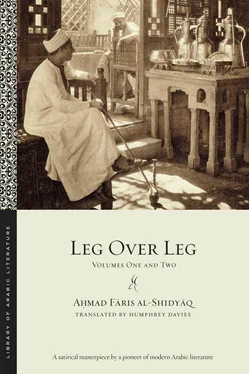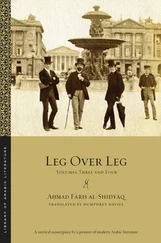632“from a certain governor”: i.e., from a provincial governor whose name was al-Qasṭalānī (“the Castilian”).
633 Cf. Qāmūs (s.v. a-w-m ): “ Ām , a town whose name is used to describe clothes.”
634“ bizyawn ”: defined in the Qāmūs as “a kind of sundus .”
635“so as to give them a place in the list appropriate to the underlying gist ” ( li-yuṭābiqa l-dhikru l-fikr ): i.e., because they are put on before anything else.
636“ ḥarr / ḥirr ”: with the first vowelling, the word means “warmth,” with the second, “vagina”.
637“in kind… kind… kinds” ( al-ʿayn… mina l-ʿayn… bi-l-maʿnayayn ): the author plays with two senses of ʿayn , namely “kind” (as opposed to “cash”) and “eye,” and rhymes the word with maʿnayayn (“two senses”).
638“he has to dissolve any knots with puffs” ( yaḥulla ʿuqdatahu bi-nafāthāt ): a reference to Q Falaq 113:1–4— qul aʿūdhu bi-rabbi l-falaq min… sharri n-naffāthāti fī l-ʿuqad (“Say, ‘I seek refuge with the Lord of the daybreak… from the evil of those who blow on knots’”), the Qurʾanic reference being to witches who performed magic using this method.
639“as al-Farrāʾ has on ḥattā ”: Yaḥya ibn Ziyād al-Farrāʾ (144–207/761–822) was a leading grammarian; ḥattā is a conjunction and preposition with multiple functions.
640“Juḥā’s dream”: Juḥā is the protagonist of jokes and anecdotes, in which he often plays the role of the “wise fool.” A version of this story goes: “Juḥā told the following story: ‘When sleeping I had a dream the first half of which was true, the second half untrue.’ ‘How can that be, O Abū Ghuṣn?’ he was asked. He said, ‘As I slept I seemed to behold myself come across a purse full of gold, silver, and golden coins, and when I picked it up, I defecated on myself from the effort of lifting it, it was so heavy. When I woke up, I found I was covered with filth and wetness, and the purse was no longer in my hands!’” (http://www.belkhechine07.com/joha.doc, accessed on 27 June 2012).
641“a leading scholar of the language…”: i.e., Jalāl al-Dīn al-Suyūṭī (see Volume One, 0.4.10).
642 “why have you foresworn writing [in general] but not [writing] about women”: in what follows, the author answers that first part of the question but appears to forget the second.
643“most people… [believe muʾallif ] refers to taʾlīf (‘making peace’) between two persons”: muʾallif in the sense of “author” etc. was a nineteenth-century neologism.
644“repugnant to some people, especially women”: because “shaykh” also means “old man.”
645“and how he stuffs them then” ( fa-zaʿabahā ayya zaʿbin ): the phrase could also be understood “and how he stuffs her then!”
646Shaykh Muṣṭafā: according to one scholar, a teacher at the mosque-university of al-Azhar but not further identified (al-Maṭwī, Aḥmad , 1:79), the same applying to the Shaykh Aḥmad, Shaykh Maḥmūd, and Shaykh Muḥammad mentioned later (2.18.3, 2.18.4, 2.19.9); however, it is possible that the author simply chose these common names to hide the identity of little-known scholars, as one might say “Tom, Dick, and Harry.”
647“Zayd and ʿAmr”: two characters used to illustrate points of grammar; for example, the sentence ḍaraba Zaydun ʿAmran (“Zayd struck ʿAmr”) illustrates the typical verb-subject-object order of the Arabic sentence.
648“happened to be asked… if he could study”: presumably, the Fāriyāq’s acquaintance asked him for an introduction to the shaykh.
649“ Baḥth al-maṭālib ”: see n. 126 to 2.11.3.
650“to write him a license to teach the book” ( an yaktuba la-hu ijāzata iqrāʾihi ): traditionally, scholarly knowledge was acquired through the study of individual books at the hands of a shaykh, with the student reading the work out loud to the teacher, who corrected and commented. When the student had acquired full mastery of the text, the shaykh would write him a licence ( ijāzah ) to teach it in the same fashion to others, just as the shaykh had earlier received a licence from his teacher, and so on.
651 Al-Talkhīṣ fī l-maʿānī : probably the commentary of Masʿūd ibn ʿUmar al-Taftazānī (d. between 791/1389 and 797/1395) on the Talkhīṣ al-miftāḥ fī l-maʿānī wal-l-bayān wa-l-badīʿ by Jalāl al-Dīn Muḥammad ibn ʿAbd al-Raḥmān al-Qazwīnī, known as Khaṭīb Dimashq (666–739/1268–1338), the “basic textbook for rhetorical studies in the madrasa s of the later Middle Ages up to modern times” (Meisami and Starkey, Encyclopedia , 2:439).
652“al-Akhḍarī’s Sharḥ al-Sullam ”: ʿAbd al-Raḥmān ibn Muḥammad al-Akhḍarī (920–83/1512–75) wrote this commentary on his own Al-Sullam al-murawnaq fī l-manṭiq .
653“the yellow air” ( al-hawāʾ al-aṣfar ): summer cholera.
654“greater affirmative universal” ( kulliyyah mūjibah kubrā ): presumably meaning, in the terms of Aristotelian logic, a “universal” statement of the form “all S are P.”
655“and not numbered among the dead” ( wa-lam yaqḍi mina l-qaḍāyā ); or, punningly, “and had not yet run out of syllogisms.”
656“the Kanz ”: probably the Kanz al-daqāʾiq of ʿAbdallāh ibn Aḥmad al-Nasafī (d. 710/1310).
657“the Risālah al-Sanūsiyyah ”: probably the Ḥāshiya (marginal commentary) of Ibrāhīm ibn Muḥammad al-Bājūrī (or al-Bījūrī) (1189–1276/1784–1859) on the Matn al-Sanūsiyyah of Muḥammad ibn Yūsuf al-Sanūsī (after 830-95/1426–90).
658“the Center of This Book”: as the thirty-ninth chapter of a work consisting of eighty, this section is, in fact, slightly off-center.
659“ hamqāq ”: according to the Qāmūs , “seeds found in the mountains of Balʿamm that are fried and eaten to increase the capacity for intercourse.”
660 mughāth: Glossostemon bruguieri , a plant with therapeutic and nutritional properties.
661“the caliphal palace” ( dār al-khilāfah ): i.e., the place where, like the caliph, or successor to the Prophet Muḥammad, the man in question carries out his duties.
662“everyone suspected… a sin that they would carry… till the Day of Judgment” ( fa-ẓanna l-nās… wa-taqalladū ithmahu… ilā yawmi l-dīn ): the passage evokes the words of the Quran inna baʿḍa l-ẓanni ithm (“Indeed some suspicion is a sin”) (Q Ḥujurāt 49:12).
663“for he was hors de combat and wasn’t up to doing anything anyway” ( fa-innahu kāna muʿaṭṭalan wa-fiʿluhu mulghan ʿani l-ʿamal ): probably an allusion to the fact that he was receiving treatment for a venereal disease (see n. 149 to 2.12.18).
664Probably Al-Qawl al-wāfī fī sharḥ al-Kāfī fī ʿilmay al-ʿarūḍ wa-l-qawāfī , a commentary by ʿAlī ibn ʿAbd al-Qādir al-Nabtītī (d. ca. 1065/1655) on a work by Yaḥyā ibn ʿAlī al-Tabrīzī (421–502/1030–1109).
665“a loft…”: see 1 Kings 17:19–20.
666“a wall” ( judāran ): “Now Absalom in his lifetime had taken and reared up for himself a pillar, which is in the king’s dale: for he said, I have no son to keep my name in remembrance: and he called the pillar after his own name: and it is called unto this day, Absalom’s place” (2 Sam. 18:8).
Читать дальше












